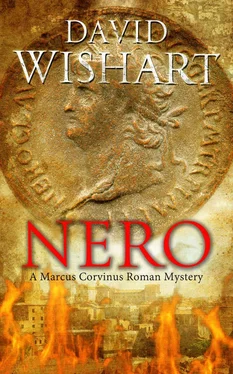David Wishart - Nero
Здесь есть возможность читать онлайн «David Wishart - Nero» весь текст электронной книги совершенно бесплатно (целиком полную версию без сокращений). В некоторых случаях можно слушать аудио, скачать через торрент в формате fb2 и присутствует краткое содержание. Год выпуска: 2015, Жанр: Исторический детектив, на английском языке. Описание произведения, (предисловие) а так же отзывы посетителей доступны на портале библиотеки ЛибКат.
- Название:Nero
- Автор:
- Жанр:
- Год:2015
- ISBN:нет данных
- Рейтинг книги:4 / 5. Голосов: 1
-
Избранное:Добавить в избранное
- Отзывы:
-
Ваша оценка:
- 80
- 1
- 2
- 3
- 4
- 5
Nero: краткое содержание, описание и аннотация
Предлагаем к чтению аннотацию, описание, краткое содержание или предисловие (зависит от того, что написал сам автор книги «Nero»). Если вы не нашли необходимую информацию о книге — напишите в комментариях, мы постараемся отыскать её.
Nero — читать онлайн бесплатно полную книгу (весь текст) целиком
Ниже представлен текст книги, разбитый по страницам. Система сохранения места последней прочитанной страницы, позволяет с удобством читать онлайн бесплатно книгу «Nero», без необходимости каждый раз заново искать на чём Вы остановились. Поставьте закладку, и сможете в любой момент перейти на страницу, на которой закончили чтение.
Интервал:
Закладка:
David Wishart
Nero
PROLOGUE: CUMAE, JUNE AD 66
A piece of advice before we start. Don't believe those fools who preach that death is a friend, or, worse, like Paullus and his crew of fanatics, the happy gateway to a better and fuller existence. It's nothing of the sort. Death, gentle reader, is nothing but a necessary bore, and you can tell it I said so. There, now.
I, Titus Petronius Niger, aesthete, author and erstwhile Adviser on Taste to Nero Claudius Caesar (the gods rot the little bugger) have reached a climacteric in my existence; I might say two climacterics, for although autobiography and suicide aren't normal bedfellows they're both pretty final, and I've no intention of rushing either to oblige anyone; certainly not by poking a sword through my own gut, which may be the traditional recourse of the Roman gentleman but is, in my view, hopelessly crude, not to say extremely messy and hell on the upholstery. No. I will bleed to death in comfort, like a civilised being. If done in a leisurely fashion by tightening and loosening the wrist-tourniquets (as I will do it), opening one's veins allows one to hang up one's clogs at a decent pace. If I really have to die before my time (and needs must, ho-hum, when the emperor drives, even when the emperor is poor loopy Lucius) then I intend to savour every minute of the process. Even if it kills me.
Dion is smiling. Dion is my secretary and, currently, my right-hand man. That, my dears, should you need such things pointing out to you, is a pun, albeit one in execrable taste. What you're reading now is all Dion's work, and Titus Petronius Niger is merely a voice: refreshed, let it be said, by the fine wines and exquisite delicacies which lade the groaning table beside his couch. Nevertheless, when the time comes for us to part I will endeavour to sign my own name across the page before I finally dispense with the tourniquets and at last allow greedy nature to run (oh, my!) her liquid course.
A disagreeable prospect, you will admit; but then we have a long way to go together first. Oh yes, my gentle friends. Lucius's men will not arrive to inspect my corpse before morning. The night is still young, these Baian crayfish are excellent, and Dion is supplied with plenty of ink and paper. So.
What exactly is this great work that we're embarked on? Not, as you might expect, a hatchet job on the man responsible for my death, the quondam Lucius Domitius Ahenobarbus, whom history will remember (unless she's lucky enough to forget him altogether) as Nero Claudius Caesar, Rome's fifth emperor (not counting old Julius), darling of the muses and self-styled theatrical genius. Oh, and of course the world's most illustrious pyromaniac; I doubt if history will forget that little nugget of scandal. Certainly Lucius — I'll call him that, by the way, since it's all the nomenclature the poor dear deserves — provides scope and to spare for character assassination, and at present, as you'll readily understand, my feelings towards him aren't exactly friendly. All the same, I can't bring myself to hate the lad, however much of a monster he's become; in fact if truth be told I feel more sorry for him than anything else (a sentiment that would have the crack-brained old Jewish humbug Paullus nodding in approval). After all, it isn't altogether poor Lucius's fault that he's in the wrong job, and he has tried his best. Being three tiles short of a watertight roof hasn't helped much, either.
So, my dears, this is no kick in the imperial teeth. Call it a most lamentable comedy. Or possibly a mirthful tragedy. And because Lucius is who he is, and I am who I am, there will also I'm sorry to say be a fair amount of dirt to be dug…
Dion is frowning, and I don't much blame him. Dion may be a slave, but the lad is no mean judge of style, and I am rambling. Petronius, you bore, you grow inelegant. Stop it at once and begin your tale.
Heigh ho and off we go. End of prologue. Let me introduce you to my coy mistress Silia.
1
We met in the Danaid Porch. Perhaps you know it, part of Apollo's temple on the Palatine? Its statues of the forty-nine married ladies who killed their husbands on the wedding night have made it the most popular place of assignation in Rome for (let's not be hypocritical about this) would-be adulterers and adulteresses like ourselves. She was standing with her maid studying the art work, I was lurking beside one of the pillars a few feet away, studying her breasts.
By any standards she was beautiful: late twenties (my own age), dark hair carefully coiffeured and masked by the thinnest of veils, a perfect profile and a body richly curved beneath an impeccably arranged Coan silk mantle. She had seen me, of course, in her turn, and we watched each other covertly for a while, sizing each other up as one does on these occasions. After a decent interval I moved in for the kill.
She glanced directly at me and remarked to her maid: 'A poor thing, Lalage, isn't she? Condemned to eternal torment just for getting rid of a boring husband.'
An invitation if I ever heard one. The maid giggled. I moved closer.
'Your poor thing would hardly have had enough time to be bored, lady.' I leaned across and set my hand next to hers on the statue's cheek, noting as I did so the ring on her third finger. 'Hours, at most.'
She smiled at me. Her teeth were pearls.
'Oh, that's quite enough time for it,' she said. 'Husbands are like tunny-fish, darling, they go off terribly quickly. Especially if they aren't fresh to begin with.'
We both laughed. In that exchange the contract had been, so to speak, proposed, drawn up and signed by both parties. Negotiations in the Danaid Porch are like that, short and sweet and to the point, with no time wasted on inessentials. Patting the stone face in farewell, she turned to her maid.
'Lalage, walk behind us, please,' she said. 'And not too closely, there's a dear.'
We made love in her bedroom, on top of a silk coverlet thickly embroidered with gold and purple beasts: it had come from China along the spice route, and must have cost a fortune. I taught her the lips and tongue trick I'd learned from a courtesan in Damascus (once, or so she told me, the mistress of Herod Agrippa himself. If so then the Jewish king had taste); she provided me with a delightful variation on the Alexandrian String of Pearls which she claimed to have invented — no mean feat, if true. All in all a pleasantly exhausting afternoon, and highly educational. Afterwards we bathed in rose water, and Lalage brought us cups of snow-cooled wine and a dish of dried figs. Then I watched while Silia dressed and the maid repaired her hair.
'You will stay for dinner, won't you?' She was holding still as the girl applied Egyptian cosmetic to her eyelashes with a fine brush. 'Gnaeus won't be back until late.'
'Gnaeus?'
'Don't be obtuse, dear. My husband.'
'Oh.' Oh yes, of course. The ring on the finger, the skull at the feast. The inevitable skull. One can no more avoid the Gnaeuses of this world than one can expect a Suburan cookhouse not to have cockroaches in the kitchen. 'Tell me about Gnaeus.'
'He's a darling,' Silia said, flicking the lashes to dry them and inspecting the effect in the mirror. 'You'd like him.'
'No doubt. But mutual compatibility wasn't exactly what I had in mind.'
She laughed. 'Titus, dear, don't look so worried. We have an arrangement. Besides, he's into boys at the moment. Or rather one boy in particular. A pretty little thing called Theorus.'
'Oh, that Gnaeus!' I had the man placed now: Gnaeus Arruntius, a paunchy middle-aged roué who'd been one of Caligula's set. Not a bad sort, although badly gone to seed since he'd helped the conspirators ventilate the godling's belly nine years previously and given us all over to idiot Claudius. He had, if I remembered rightly, an appalling taste in hair oil.
Читать дальшеИнтервал:
Закладка:
Похожие книги на «Nero»
Представляем Вашему вниманию похожие книги на «Nero» списком для выбора. Мы отобрали схожую по названию и смыслу литературу в надежде предоставить читателям больше вариантов отыскать новые, интересные, ещё непрочитанные произведения.
Обсуждение, отзывы о книге «Nero» и просто собственные мнения читателей. Оставьте ваши комментарии, напишите, что Вы думаете о произведении, его смысле или главных героях. Укажите что конкретно понравилось, а что нет, и почему Вы так считаете.












